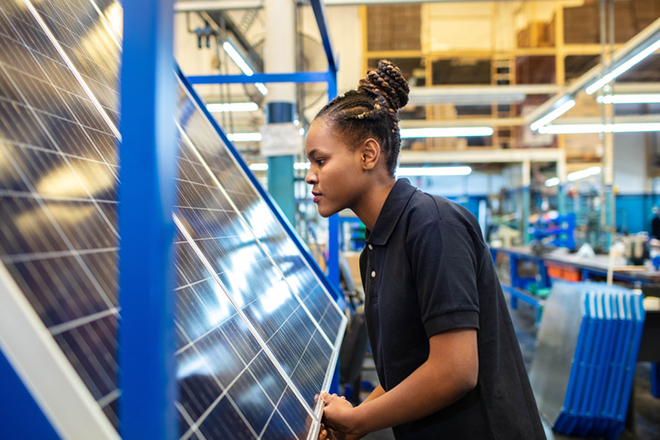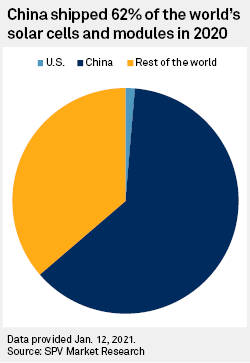Featured Topics
Featured Products
Events
S&P Global Offerings
Featured Topics
Featured Products
Events
S&P Global Offerings
Featured Topics
Featured Products
Events
S&P Global Offerings
Featured Topics
Featured Products
Events
Financial and Market intelligence
Fundamental & Alternative Datasets
Government & Defense
Professional Services
Banking & Capital Markets
Economy & Finance
Energy Transition & Sustainability
Technology & Innovation
Podcasts & Newsletters
Financial and Market intelligence
Fundamental & Alternative Datasets
Government & Defense
Professional Services
Banking & Capital Markets
Economy & Finance
Energy Transition & Sustainability
Technology & Innovation
Podcasts & Newsletters
15 Jan, 2021

|
A worker inspects solar panels at a factory in Argentina. |
SunPower Corp.'s recent decision to close its only solar manufacturing plant in the U.S. underscores the challenges President-elect Joe Biden faces as he tries to boost domestic production of clean energy technology, a cornerstone of the incoming administration's economic and climate strategy.
SunPower said Jan. 7 that it plans to shutter a solar panel factory in Oregon, less than three years after it bought the facility and months after SunPower spun off its international manufacturing business into a new Singapore-based company called Maxeon Solar Technologies Ltd.
The exits come as solar manufacturing is consolidating around a handful of the industry's biggest players, most of which are headquartered in China. Maxeon, previously a unit of SunPower, said basing the new company's operations in Asia would hold down costs and make it more competitive.
"There is no rational need for the U.S. to have domestic manufacturing of solar modules or inverters — that is best done in low-cost geographies," Pavel Molchanov, an equity analyst in Raymond James & Associates' energy group, said in an email.
U.S. policymakers disagree. The Trump administration imposed tariffs in 2018 to try to push solar cell- and panel-makers to open factories in America. The duties, which have supported a relatively small amount of new domestic production, followed similar efforts by the Obama administration.
As the Biden administration prepares to take power Jan. 20, it is forming its own plan to make the U.S. a global leader "in inventing, manufacturing, and exporting clean energy technologies," according to a policy document. The Biden transition team did not respond to a message seeking comment.
"I'm very optimistic that under the new administration, we're going to continue to see policies that result in localizing technology, manufacturing and jobs," said Paul Wormser, vice president of technology at Clean Energy Associates Ltd., a supply-chain manager and engineering firm. "The past recent practice has been to sort of hope that that would happen by putting tariffs on imports. I think under the new administration, we're not going to see tariffs disappear, but … we're going to see some new carrots."
SunPower did not respond to a message seeking comment. The company bought the Oregon plant in 2018 in a deal motivated in part by the Trump administration's import tariffs. SunPower Chairman and CEO Tom Werner told the U.S. International Trade Commission in 2019 that the country lacks the kinds of incentives that attract manufacturers to Asia.
Confronting China
Alleged human rights abuses of Uighurs and other Muslim minorities in China's autonomous Xinjiang region could provide more impetus for trying to shift clean-energy manufacturing and supply chains away from China and to the U.S.
Horizon Advisory, a consultancy, recently said there are signs that forced labor is being used by companies in Xinjiang that make polysilicon, a key feedstock in solar panels. The firm published its research after S&P Global Market Intelligence reported that America's top solar trade group, the Solar Energy Industries Association, is urging companies to move their supply chains out of Xinjiang, which supplied around one-third of the polysilicon that the industry used globally last year to make solar panels.
Beijing denies it is committing human rights abuses. Nevertheless, Washington continues to move toward confronting China over the allegations. In September 2020, the U.S. House of Representatives passed a bill that would ban goods made "wholly or in part" in Xinjiang unless the producers were proven not to have used forced labor. A Biden spokesman previously said that the then-presidential candidate believed the Chinese government is committing "genocide" against Uighur Muslims in Xinjiang.
Wormser said it is a "foregone conclusion" that U.S. lawmakers will soon pass a law targeting alleged labor abuses in Xinjiang.
In the meantime, U.S. Customs and Border Protection continues to seize imports from the region. On Jan. 13, the agency said it will detain all cotton and tomato products from Xinjiang. "CBP will not tolerate the Chinese government's exploitation of modern slavery to import goods into the United States below fair market value," said CBP Acting Commissioner Mark A. Morgan in a statement.
"From the top down, this is part and parcel of the awakening that we've had in the United States and in the west about the indirect and latent costs associated with doing business with the Chinese Communist Party," Nathan Picarsic, cofounder of Horizon Advisory, said in an interview. "For efficiency or short-term profit, we're exchanging long-term positioning and adherence to … our traditional values and norms."
"If you continue on the China path," Picarsic added, "you're going to be continuing to build on tainted ground."
 |
Harsh realities
Labor issues aside, though, standing up factories and supply chains for clean energy equipment outside of China's orbit would be costly.
"Expect governments to turn pale and run for cover at the cost of supporting domestic manufacturing," Paula Mints, chief analyst at SPV Market Research, wrote in a December 2020 report. "[As] major cell and module manufacturers in China ramp … capacity, the competitive realities for manufacturers outside of China become harsher as they must meet China's price."
China shipped 62% of the world's solar cells and panels in 2020, according to Mints. Including capacity that Chinese manufacturers have moved to other parts of Asia, the country's share of global shipments rises to more than 80%. The U.S., by comparison, accounted for just 1% of global shipments last year.
But Wormser of Clean Energy Associates remains hopeful.
"This is an issue of being competitive, and that takes many flavors," Wormser said. "Competitive means I can show you I'm not using forced labor. Competitive means I can show you I have a more robust supply chain that's less likely to get interrupted by pandemics. Competitive means my cost is competitive and therefore my price is competitive and my product quality is competitive."
